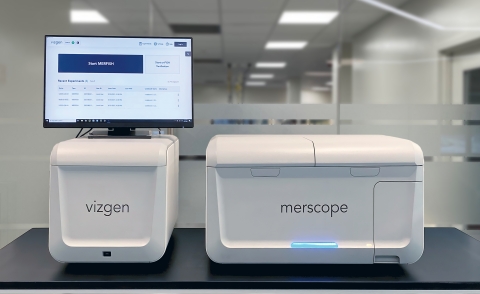Vizgen Releases Commercial MERSCOPE Platform
Vizgen Releases Commercial MERSCOPE Platform
First single-cell spatial genomics instruments on the market have shipped to key research institutions
Vizgen releases MERSCOPE Platform to leading research institutes. MERSCOPE is the first commercially available high-plex, single-cell spatial genomics platform for spatially profiling gene expression across whole tissues and resolving individual transcripts with nanometer-scale resolution. (Photo: Business Wire)
CAMBRIDGE, Mass.--(BUSINESS WIRE)--Vizgen, the life science company dedicated to improving human health by visualizing single-cell spatial genomics information, today announced shipment of the first commercial MERSCOPETM Platforms, marking the successful start of their limited summer release program. These first platforms are being purchased by leading research institutes including the Salk Institute, the University of California, Irvine, and the Beth Israel Deaconess Medical Center. Vizgen will continue shipping a limited number of commercial instruments for the next several months before releasing MERSCOPE to the U.S. market at large in late 2021.
MERSCOPE is the first commercially available high-plex single-cell spatial genomics platform, and the only platform for MERFISH technology. Developed in the laboratory of Dr. Xiaowei Zhuang, a Howard Hughes Medical Institute Investigator, and David B. Arnold, Jr. Professor of Science at Harvard University, MERFISH provides the highest detection efficiency available for spatially profiling gene expression across whole tissues and resolving individual transcripts with nanometer-scale resolution through combinatorial labeling, sequential imaging, and error-robust barcoding.
“This is a revolutionary time for the field of genomics. Researchers across the country are now able to access the spatial dimension to answer new kinds of scientific questions and make significant biological discoveries,” said Terry Lo, President and CEO of Vizgen. “Profiling the expression of hundreds of genes, in hundreds of thousands of cells, for hundreds of millions of transcripts all while retaining the spatial information within the tissue architecture has never been done before. What was previously unimaginable, MERSCOPE now makes routine.”
One MERSCOPE platform has been installed in the lab of Xiangmin Xu, Professor of Anatomy & Neurobiology and Director of the Center for Neural Circuit Mapping, School of Medicine at the University of California, Irvine, who purchased the system after seeing promising results when working with Vizgen earlier this year. “I’m excited to have a MERSCOPE system installed in our Center, where we will use it to explore the molecular mechanisms of Alzheimer’s disease on a spatial transcriptome-wide level,” says Xu. “I look forward to building on the proof-of-concept study, which cataloged the spatial distribution of 150 target genes in specific cell types and identified where early changes in gene expression occur in a mouse model of Alzheimer’s disease.”
Another MERSCOPE platform is being installed at the Salk Institute Imaging Core facility. It will join other state-of-the-art imaging instruments accessible to cross-disciplinary Salk researchers driving the development of the next generation of microscopy and computational methods and other biological tools, with the goal of understanding health and disease. "In my lab we are interested in biomechanical modeling of muscle, which requires a thorough understanding of the cellular and molecular organization within the tissue,” said Pallav Kosuri, Assistant Professor, Salk Institute. “By using MERFISH to create organ-wide atlases, we will be able to root our models in the precise architecture of actual muscle.”
Beth Israel Deaconess Medical Center has also acquired a MERSCOPE platform for their Spatial Technologies Unit, the first center of its kind in Massachusetts. MERSCOPE will be widely accessible to members of both academia and industry to enable innovations and breakthroughs in precision medicine. “Spatial Technologies are the new frontier in biomedical research, and we expect them to expand and potentially rewrite our understanding of human pathologies,” said Ioannis Vlachos, PhD, Director of the Spatial Technologies Unit and Co-Director of the Bioinformatics Program at BIDMC.
Vizgen’s MERSCOPE is the only integrated solution for running MERFISH experiments, and the first complete platform for single-cell spatial genomics. The instrument is flexible and amenable to a large variety of sample or tissue types. It is also accompanied by a custom gene panel design portal, reagents and consumables, an analytical computer, and data visualization software. The MERSCOPE Platform offers a user-friendly workflow facilitating each step of a MERFISH experiment, from sample preparation, to measurement, and finally data visualization and analysis. Together these features enable the spatial profiling of hundreds of individual transcripts within hundreds of thousands of cells in a single instrument run.
To learn more about MERSCOPE, please visit: vizgen.com/products.
About Vizgen
Vizgen is dedicated to pioneering the next generation of genomics, providing tools that demonstrate the possibilities of in situ single cell spatial genomics, setting the standard for the spatial genomics field. These tools are enabling researchers to gain new insight into the biological systems that govern human health and disease with spatial context. The company's MERSCOPETM platform enables massively multiplexed, genome-scale nucleic acid imaging with high accuracy and unrivaled detection efficiency at subcellular resolution. MERSCOPE provides transformative insight into a wide range of tissue-scale basic research and translational medicine in oncology, immunology, neuroscience, infectious disease, developmental biology, cell and gene therapy, and is an essential tool for accelerating drug discovery and development. For more information, go to www.vizgen.com. Connect on social media Twitter, LinkedIn and Facebook.
Contacts
Media:
Kate Proudfoot
CG Life
kproudfoot@CGLife.com
Vizgen:
Brittany Auclair
Vizgen
Brittany.auclair@vizgen.com

